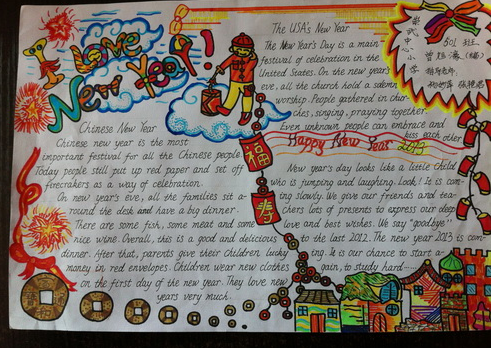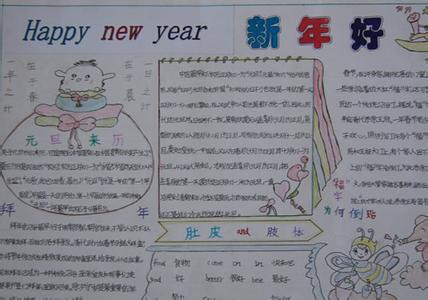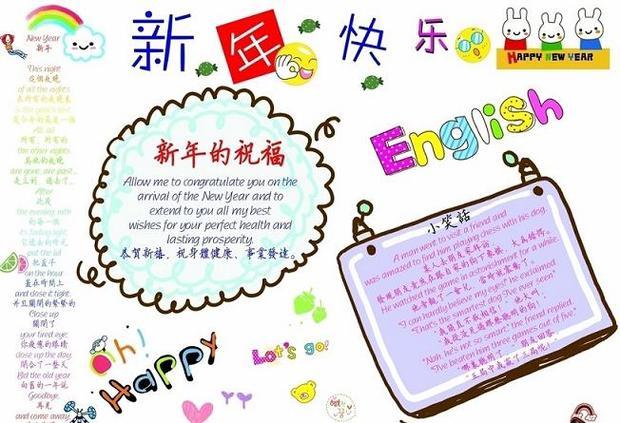中国古代的元旦,即现代中国所称之“春节”的习俗,以下是出国留学网小编为您整理元旦手抄报的内容英语,供您参考,希望对你有所帮助,更多详细内容请点击出国留学网查看。
元旦手抄报的内容英语1

元旦手抄报的内容英语2

元旦手抄报的内容英语3

元旦手抄报的内容英语4:新年祝福语
you all my best wishes for your perfect health and lasting prosperity.
恭贺新禧,祝身体健康、事业发达。
Best wishes for the holidays and happiness throughout the New Year.
恭贺新禧,万事如意。
诗词:Hope you will join with me in bringing in the new spring.
愿和你一起迎春接福。
The coming of spring means the coming of new hopes.
春天的来临,象征新希望的到来。
May you have many dreams fulfilled.
祝你许多美梦都能成真。
We wish you a renewed hope in life.
我们祝福你再度燃起生命的希望。
Please join us to light off firecrackers.
让我们一起来燃放爆竹除旧岁。
We hope your family and my family can get together for a celebration like last year.
我们希望你们全家与我们家能像去年一样,聚在一起共同庆祝新年。
Wishing you and your family peace and prosperity for the coming year.
祝福你与家人吉祥平安。
May the people of the nation live happily and wealthily this upcoming year.
愿新的一年里国富民安。
元旦手抄报的内容英语5:元旦歌词
AULD LANG SYNE
Should auld acquaintance be forgot
and never brought to mind?
Should auld acquaintance be forgot
and days of auld lang syne?
For auld lang syne, my dear,
for auld lang syne,
we'll take a cup of kindness yet,
for auld lang syne.
这是材料:
The origin of the Chinese New Year is itself centuries old - in fact, too old to actually be traced. It is popularly recognised as the Spring Festival and celebrations last 15 days.
Preparations tend to begin a month from the date of the Chinese New Year (similar to a Western Christmas), when people start buying presents, decoration materials, food and clothing.
A huge clean-up gets underway days before the New Year, when Chinese houses are cleaned from top to bottom, to sweep away any traces of bad luck, and doors and windowpanes are given a new coat of paint, usually red. The doors and windows are then decorated with paper cuts and couplets with themes such as happiness, wealth and longevity printed on them.
The eve of the New Year is perhaps the most exciting part of the event, as anticipation creeps in. Here, traditions and rituals are very carefully observed in everything from food to clothing.
Dinner is usually a feast of seafood and dumplings, signifying different good wishes. Delicacies include prawns, for liveliness and happiness, dried oysters (or ho xi), for all things good, raw fish salad or yu sheng to bring good luck and prosperity, Fai-hai (Angel Hair), an edible hair-like seaweed to bring prosperity, and dumplings boiled in water (Jiaozi) signifying a long-lost good wish for a family.
It's usual to wear something red as this colour is meant to ward off evil spirits - but black and white are out, as these are associated with mourning. After dinner, the family sit up for the night playing cards, board games or watching TV programmes dedicated to the occasion. At midnight, the sky is lit up by fireworks.
On the day itself, an ancient custom called Hong Bao, meaning Red Packet, takes place. This involves married couples giving children and unmarried adults money in red envelopes. Then the family begins to say greetings from door to door, first to their relatives and then their neighbours. Like the Western saying "let bygones be bygones," at Chinese New Year, grudges are very easily cast aside.
The end of the New Year is marked by the Festival of Lanterns, which is a celebration with singing, dancing and lantern shows.
Although celebrations of the Chinese New Year vary, the underlying message is one of peace and happiness for family members and friends.
这是翻译:
农历新年的起源是它几个世纪的历史岁月,事实上,这由于年代过于久远而无法被准确的追溯。人们通常称之为春节并庆祝长达15天的时间。
准备的工作通常在农历新年(类似于西方的圣诞节)之前的一个月就已经展开,也就是人们开始购买礼物,装饰品,材料,衣服和食物。
大扫除会在新年之前展开,华人的房屋会被彻底的打扫,扫去厄运,给门和窗子上新漆,通常都是红色的。在门和窗子上贴上剪纸和印有喜气,长寿,发财主体的对联。年三十夜或许是最激动人心的部分,如预期般的悄悄接近。这里,服装和食物上都体现着族传统礼仪的遵从。
晚餐,通常都是饺子和海鲜酒席。象征着不同的美好祝愿,微妙的东西包括有虾来祝愿幸福快乐,干贝祝愿完事顺利,生鱼来祝愿好运和繁荣。Fai-hai 一种像头发般的可食用海藻带来繁荣的祝愿,水饺意味着对家庭的美好祝愿。
通常穿上红色的衣服,认为这种颜色可以避邪。但是绝不穿黑色和白色的。那些颜色通常和悲痛相联系。饭后家人们不睡,玩棋牌,看电视节目都融入于这种气氛。深夜,天空被烟花所点亮。
在农历新年当天,有一个古老的传统叫做红包,意思就是红色的小包。就是已婚的夫妇给小孩和未婚的成年人装在红信封里的钱。而后一家人开始串门问候,先去他们的亲戚家,而后是邻居。就如西方所说的,让过去的就成为过去吧。在农历新年,过去的过劫非常容易就被抛开了。
新年的最后一天被称为灯笼节,以唱歌跳舞观灯笼的方式来庆祝。
虽然庆祝农历新年的方式很多,但其根本意义是,家庭和朋友的幸福快乐。
元旦手抄报的内容英语6:元旦英文传说
In a legend about the prosperous era of Yao and Shun some 4000 years ago, when Yao was the king, he created many benefits for the people and was loved by them. However, since his son was not as capable as him, Yao did not pass on his throne to his son but to Shun, a wise and saintly man. Yao said to Shun: "You must pass the throne to a right person. Then I will feel at peace when I die." Shun passed his throne to Yu, who was a hero because he could control flooding. Just like Shun, Yu also did a lot of good deeds for the people and was revered by them. After Yao died, Shun set the day he made sacrifices to the heavens and gods, as well as to the late Yao, as the first day of the year, and the first day of the 1st lunar month became known as Yuan Dan or Yuan Zheng. This was Yuan Dan in ancient times. Previous dynasties would organize celebrations and sacrifices on Yuan Dan, for example sacrificing to the immortals and their forefathers, writing Spring Festival scrolls, writing character fortunes and dragon dancing.
关于元旦节的传说,相传是再4000多年前远古的尧舜之时,尧天子在位时勤政于民,为老百姓办了很多好事,很受广大老百姓爱戴,但因其子无才太不成器,尧没把“天子”之位传给自己的儿子,而是传给了品德才能兼备的舜。尧对舜说:“你今后一定要把帝位传给值得的人,待我死后也可安心瞑目了”。后来舜把帝位传给了治洪水有功的禹,禹亦像舜那样亲民爱民为百姓做了很多好事,都十分受人爱戴。后来人们把尧死后,舜帝祭祀天地和先帝尧的那一天,当作一年的开始之日,把正月初一称为“元旦”,或“元正”,这就是古代的元旦。历代皇朝都在元旦举行庆贺典仪祈祀等活动,如祭诸神祭先祖,写门对挂春联,书写福字、舞龙灯。
People also celebrated the day by making sacrifices to immortals and ancestors, pasting spring festival scrolls onto their houses, setting off firecrackers, staying up all night, eating dinners at reunions as well as putting on a "society fire". These scenes are of such impact that the poet Xin Lan in the Jin Dynasty immortalised the scenes of Yuan Dan in his poem Yuan Zheng.民间也逐渐形成祭神佛、祭祖先、贴春联、放鞭炮、守岁、吃团圆饭以及众多的“社火”等娱乐欢庆活动。晋代诗人辛兰曾有《元正》诗(元正启令节,嘉庆肇自兹。咸奏万年觞,小大同悦熙)记述元旦庆贺情景。
小编精心推荐
元旦节手抄报 | 迎新年手抄报 | 元旦小报 | 元旦黑板报 | 元旦资料
小编精心推荐